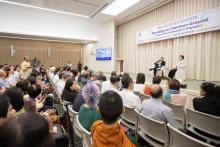After a morning of high-level discussion at the City Dialogues Vienna, participants broke into three focused tracks to forge actionable solutions for the future of our cities. Moving beyond broad definitions, these sessions confronted the fundamental dilemmas at the heart of building resilient communities. Moderated by leading academics Professor Winston Chow, Mr Johannes Lutter, and Professor Orlando Woods, the tracks explored the complex interplay between finance, social equity, and technology.
This article is featured in Special Feature: Navigating Urban Sustainability.
Cities face a web of shared challenges like surging populations, ageing demographics and the looming threat of climate change. Out-of-the-box thinking and research-based insights are crucial in helping urban leaders find the best way forward, with resilience and adaptability. Given the scale and urgency of these issues however, no city can achieve this in isolation.
This article is being featured in Special Feature: From Living to Thriving
This article is being featured in Special Feature: From Living to Thriving
Last Updated: 31 July, 2023
Did you know that when you use a packet of tissue to reserve or “chope” a vacant table at the foodcourt, you are doing what villagers used to do to mark ownership? It was a common practice for villagers to use trees, rocks, or rivers to mark the space and say “this land is mine.”
A young man with a mental disability is cheated of his late mother’s life savings by a man claiming to be a friend. A property agent takes advantage of an elderly man with an intellectually-disabled daughter, by pocketing the sales proceeds of a flat the client had engaged him to sell.
These are two of many cases of vulnerable persons in Singapore being financially abused - a consequence of systemic gaps, insufficient protective measures and a lack of financial planning by families of individuals with special needs.
This article is being featured in Special Feature: Strength in Diversity
During Singapore’s circuit breaker period, various incidences of the elderly flouting safe distancing rules emerged in the media, leading to conce
No man is an island — that proverbial expression rings especially true now, when the health and safety of each individual depends so acutely on the decisions and behaviours of others. In the time of Covid-19, it becomes more apparent than ever that what makes or breaks a community is the result of individual actions.










